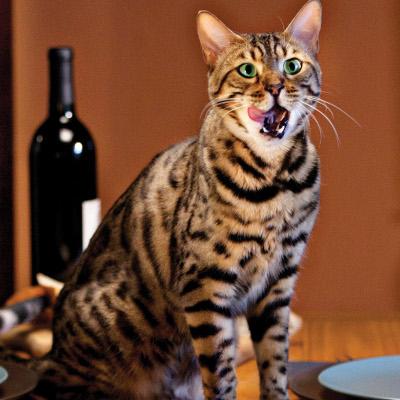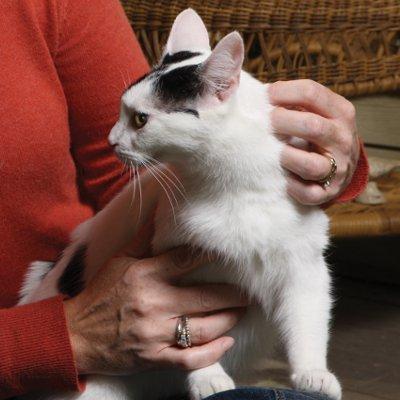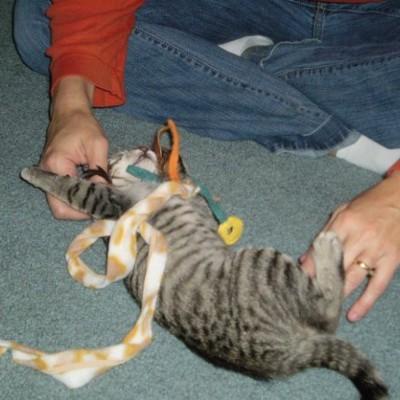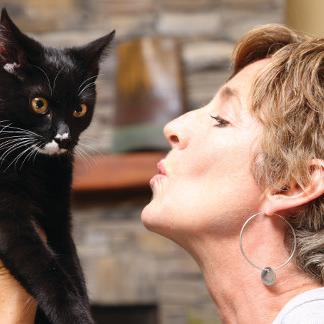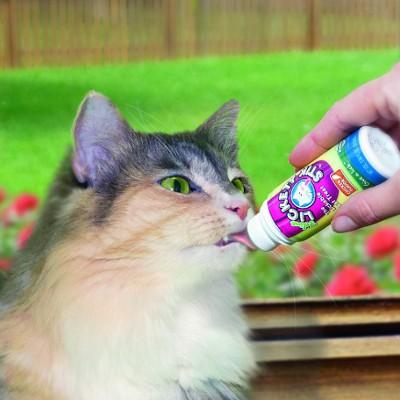Cats meow for all kinds of reasons and excessive meowing can drive you crazy. To understand how to manage and stop your cat's excessive meowing, you must first understand why they do it, and how you may actually be encouraging the loud mouth kitty.
How Cats Communicate
Cat language--what I call "felinese"--is composed of a combination of body postures, scent signals and vocalizations. Humans are scent-blind compared to cats, and we often overlook tail talk and ear signals that make up the majority of their communication. But feline yowls, growls, hisses and purrs get our undivided attention--especially at 5:00 a.m.
There are sixteen distinct feline vocal patterns. They fall under four general categories:
-
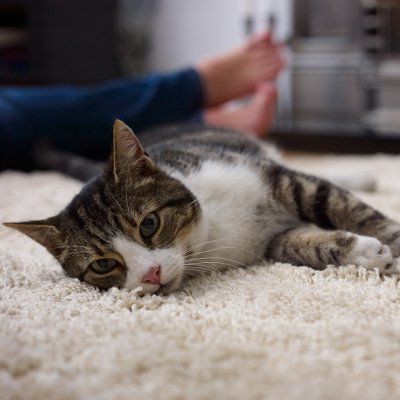 murmur patterns include purrs and trills
murmur patterns include purrs and trills - vowel patterns are meows in all their variations (cats can produce several diphthongs, too)
- articulated patterns are chirps and chattering that express frustration
- strained intensity patterns are warnings such as hisses and growls.
Experts also speculated that some cat vocalizations may be so subtle, or pitched at such a high frequency, that only other cats can hear these "silent meows."
Not all cats are vocal. Persians and Chartreux breeds tend to be rather quiet, and my young cat Karma rarely meows and has a soft, sweet voice when he dos. Other cats never shut up. Siamese and Oriental-type breeds are especially talkative. My cat Seren(dipity) holds long, drawn-out conversations and insists on having the last word.
Causes of Excessive Meowing
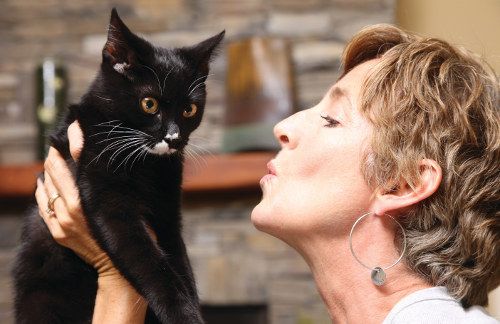 Felines use this wide range of vocalizations to communicate with other cats, but seem to reserve "meows" primarily for talking to their people. Don't assume that the meows are strictly a behavior problem, especially if your quiet cat suddenly starts yowling. There are several health issues that can prompt excess cat "yelling."
Felines use this wide range of vocalizations to communicate with other cats, but seem to reserve "meows" primarily for talking to their people. Don't assume that the meows are strictly a behavior problem, especially if your quiet cat suddenly starts yowling. There are several health issues that can prompt excess cat "yelling."
DEAFNESS: Deaf cats that can't hear themselves turn up the volume. They may not hear you, and cry more when they can see you in a particular room of the house. Yelling back to them, "I'm here!" or the vibration of your stomping a foot may calm the meows.
HIGH BLOOD PRESSURE: Hypertension can increase vocalizations, too. This can develop as a consequence of kitty heart disease or kidney problems. Your veterinarian should be able to diagnose and recommend medications to help.
 KITTY ALZHEIMER'S: Feline cognitive disorder affects a percentage of old cats usually over the age of 14. These cats may simply forget where they are or get lost in a room, and cry for you to come find them, for example. Increased vocalizations is one sign of this condition. While old age can't be reversed, there is an off-label (dog) medication that may help a percentage of cats, so ask your vet about that option.
KITTY ALZHEIMER'S: Feline cognitive disorder affects a percentage of old cats usually over the age of 14. These cats may simply forget where they are or get lost in a room, and cry for you to come find them, for example. Increased vocalizations is one sign of this condition. While old age can't be reversed, there is an off-label (dog) medication that may help a percentage of cats, so ask your vet about that option.
ATTENTION: For most cats, meows are demands: let me OUT, let me IN, pet me, play with me, FEED me! As the cat becomes more passionate and insistent, his meows grow more strident and lower-pitched. Meow demands most frequently take place in the wee hours of the night, when owners want to sleep. Some loud-mouth cats will meow more and solicit attention when they feel stress, possibly due to feline separation anxiety.
How to Silence Meows
Figure out WHY your cat cries. Anytime the vocalization either increases or decreases suddenly, please see the veterinarian. When a health problem is corrected, often the behavior issue goes away.
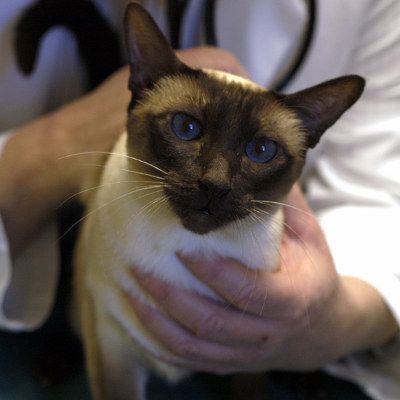 Cats are creatures of habit, and learn very quickly to repeat a behavior that works. Ask yourself--when she meows, what do you do? Pick her up? Pet her? Yell and chase her, or toss a pillow? Or perhaps you get up at 3 am, and fill the food bowl?
Cats are creatures of habit, and learn very quickly to repeat a behavior that works. Ask yourself--when she meows, what do you do? Pick her up? Pet her? Yell and chase her, or toss a pillow? Or perhaps you get up at 3 am, and fill the food bowl?
Congratulations--she's trained YOU and you've rewarded her meowing by giving her what she craves. Any kind of attention, even bad attention, is better than being ignored. Also, the longer you wait before giving in to her meow-demands teachers her to be persistent and meow that much longer. She learns that the longer she yowls, the more likely she'll succeed.
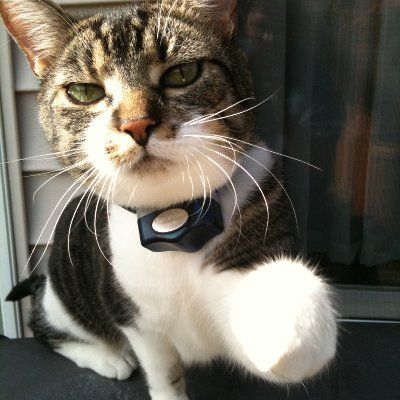 Instead, you must practice some tough kitty love. Ignore the meows. Repeat after me: IGNORE THE MEOWS! That means you don't look at her, talk to her, squirt with water, toss a pillow, yell, throw a toy--you absolutely and totally ignore the cat.
Instead, you must practice some tough kitty love. Ignore the meows. Repeat after me: IGNORE THE MEOWS! That means you don't look at her, talk to her, squirt with water, toss a pillow, yell, throw a toy--you absolutely and totally ignore the cat.
There will be an "extinguish burst" in the behavior. That means the meowing will get a whole lot worse right before it goes away, so be prepared to expect this. It means you're nearly there! I know it's hard to ignore meowing. If it's gone on for any length of time (a month or longer), it could easily take an equal amount of time to stop excessive meowing. Yikes!
Build a new routine for your cat, one that doesn't rely on her meowing for attention. Feed her on your schedule, and not when she meows. Offer some dry food or treats in a kitty puzzle toy so she always has something to much and doesn't need you to open the can. Teach her to use an automatic door to access her safe outside enclosure, and she won't turn you into the doorman at her beck and yowl. Confine her in a soundproof room across the house when she becomes a pester bug. She'll learn that the only attention meows get her is a time-out in her private room. Finally, if all else fails, invest in earplugs.

